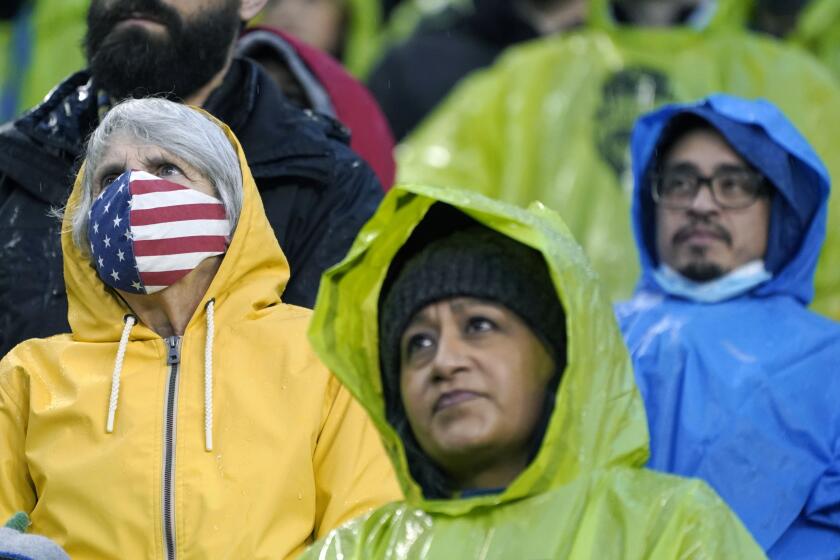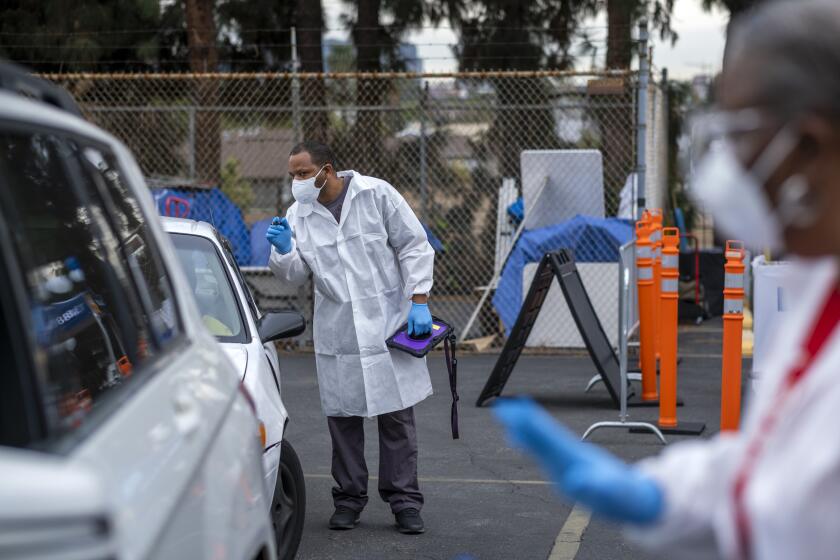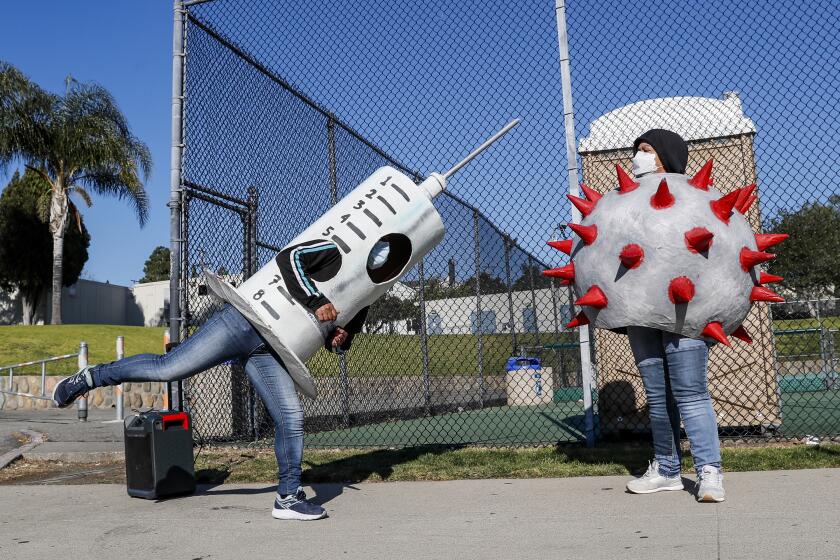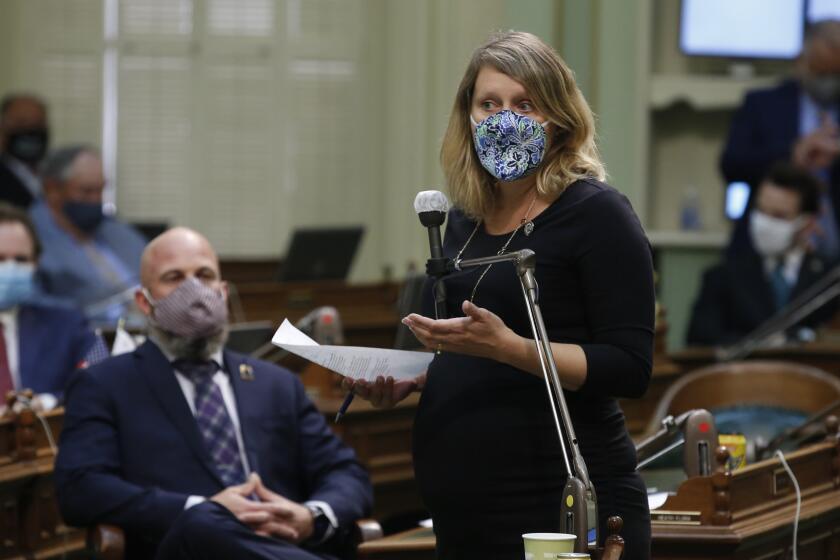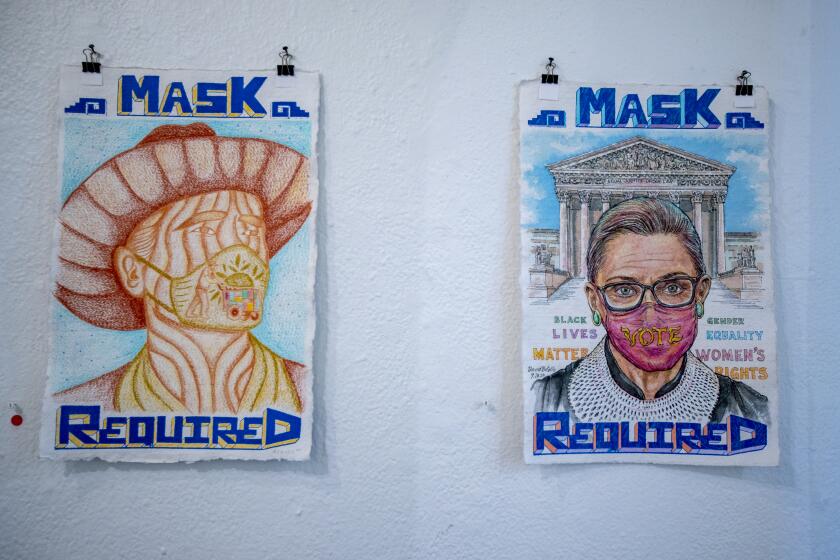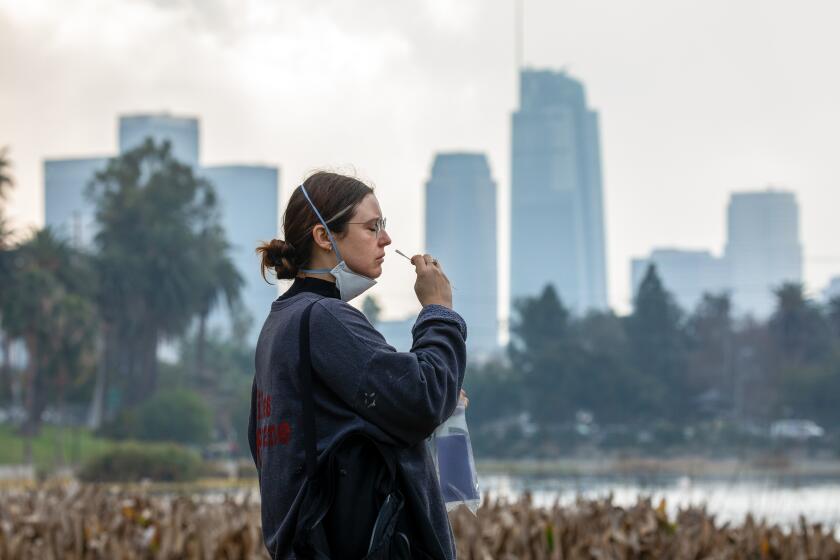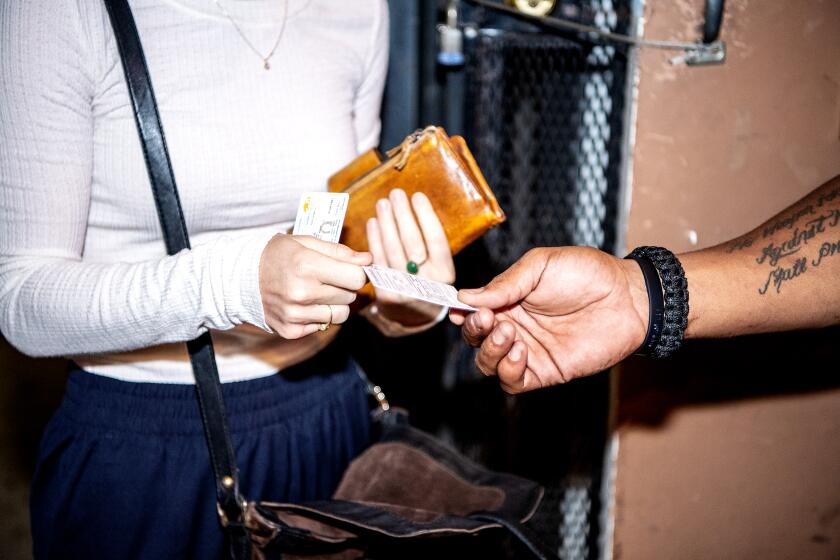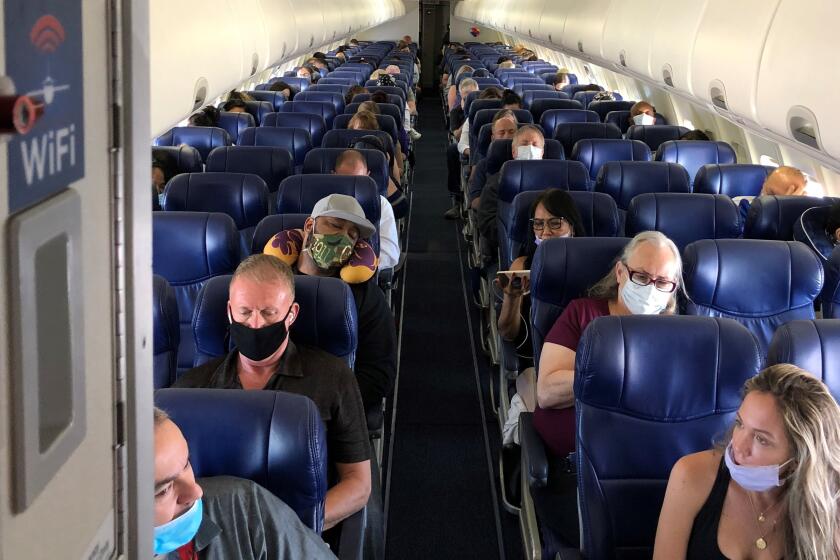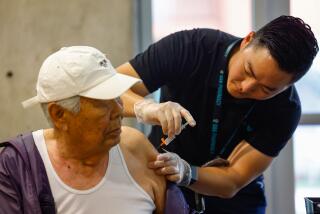Now is the time to get a second COVID booster shot, L.A. County says
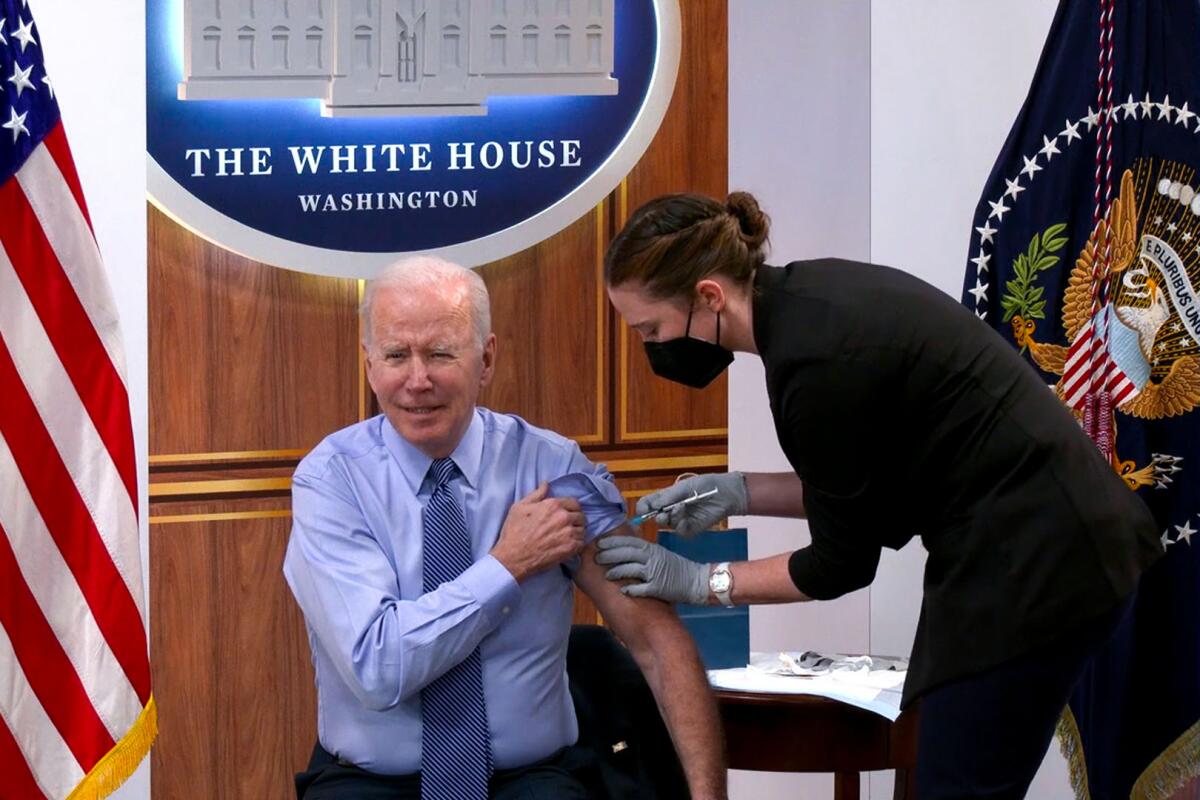
- Share via
Now is the time for those at higher risk from COVID-19 to get a second booster dose, Los Angeles County’s public health director said, citing less-than-ideal overall vaccination rates along with concerns swirling around the rapid spread of the highly contagious BA.2 Omicron subvariant.
“Evidence all over the world shows waning protection from the vaccines over time,” L.A. County Public Health Director Barbara Ferrer said Thursday. “People who are at higher risk, people who are older, people who have underlying health conditions: Don’t delay.”
Ferrer made the comments days after the U.S. Food and Drug Administration and Centers for Disease Control and Prevention made another booster dose available to adults age 50 and over, as well as those age 12 and up who have weakened immune systems.
“I hear a lot [of] — ‘I’m just going to wait. I think there’s going to be something better. I don’t want to keep getting a shot every four months.’ But if there’s waning protection, and you can get a shot that actually boosts your protection, and you’re a person at higher or elevated risk, it makes sense to go ahead and get that booster dose,” Ferrer said.
There remain millions of people in L.A. County that are not up-to-date on their COVID-19 vaccinations, Ferrer said: 1.7 million people ages 5 and older who haven’t received a single dose, and an additional 2.8 million vaccinated residents age 12 and up who haven’t received their first booster.
“These gaps in vaccination coverage create a lot of risk” of coronavirus transmission, Ferrer said. “We have enough transmission that you don’t really want to be increasing your risk.”
Ferrer also suggested that people who recently survived a coronavirus infection during the winter Omicron surge also get up-to-date on their vaccinations. While surviving a recent infection will provide some degree of protection, “that natural immunity also wanes over time,” Ferrer said.
“Get vaccinated, even if you were infected, because it really helps ensure your immune system is able to respond most effectively against the threats of circulating strains of this virus,” Ferrer said.
This week’s decision by federal health officials to expand subsequent booster availability comes as a number of experts say they expect the nation will see an increase in coronavirus cases this spring due to the dominance of Omicron BA.2; waning immunity; reduced use of masks; and further relaxation of other pandemic restrictions, such as vaccination verification requirements.
Many Americans are significantly relaxing how often they wear masks and take other once-routine coronavirus precautions.
Here’s everything you need to know about the state of the pandemic and the second COVID-19 booster shot:
Why was a second booster shot made available?
Early data suggest that a second booster shot of the Pfizer-BioNTech or Moderna vaccine improves protection against severe illness, according to the FDA. People age 50 and up are able to get a second COVID-19 booster shot once they’re at least four months removed from their first booster.
A second booster is especially important for those 65 and older, and those 50 and older with underlying medical conditions, officials say.
This would be the fourth shot overall for those who were originally vaccinated with the two-dose Pfizer-BioNTech or Moderna vaccine, and the third for those who originally got the single-shot Johnson & Johnson.
While the first booster shot retains some degree of effectiveness over time, “the available data also show that immunity does wane to some extent over time in older adults and those with weakened immune systems,” Dr. Peter Marks, director of the FDA’s Center for Biologics Evaluation and Research, told reporters at a briefing.
Older people and those with compromised immune systems “may be more likely to experience severe outcomes if they get COVID-19,” Marks said. Making a second booster shot available “will help save lives and prevent severe outcomes among our highest risk patients.”
What data support a second booster?
Israel has already authorized a second booster for people age 60 and older, and a recent study — not yet peer-reviewed — suggests the subsequent shot reduced the risk of dying due to COVID-19.
Of about 563,000 people age 60 to 100 in Israel who were members of a healthcare provider, 58% received a second booster. Among those who got a second booster, 92 people later died due to COVID-19, while 232 who had only one booster dose died.
The data show a 78% reduction in mortality rates among those who got the second booster shot compared with those who got one booster, the study found.
Here’s how to get your second COVID-19 booster shot if you are 50 or older.
Another report, published in the New England Journal of Medicine, from a study of more than 1,000 healthcare workers in Israel found that the second booster shot was safe and resulted in increased levels of antibodies. Healthcare workers who didn’t get the second booster saw their levels of antibodies continue to wane.
“Our data provide evidence that a fourth dose of mRNA vaccine is immunogenic, safe, and somewhat efficacious (primarily against symptomatic disease),” the report said.
Officials are still studying whether to make a second booster available for Americans younger than 50.
The bill would have required employees and independent contractors to be vaccinated against COVID-19 as a condition of employment unless they have an exemption based on a medical condition, disability or religious beliefs.
What do experts say the Israeli data show?
Dr. Peter Chin-Hong, a UC San Francisco infectious disease expert, said the Israeli data suggests making a second booster available in a country as large as the U.S. could potentially save thousands of lives.
Raising antibody levels following the second booster dose “would imply additional protection,” said Dr. Robert Kim-Farley, a UCLA epidemiologist and infectious-disease expert.
Why is the second booster available to those 50 and up?
Israel made the second booster available to those age 60 and up, as well as younger people considered at high risk for severe illness due to COVID-19, Marks said.
But it has been challenging in the U.S. for vaccine providers to determine who is at high risk.
Given that one in three Americans ages 50 to 65 have significant underlying medical conditions, the FDA decided to lower the eligibility threshold for the second booster to 50. Doing so, Marks said, “would capture the population that might most benefit” from this booster dose.
Other countries have imposed higher age criteria for the second booster for most people. Britain is offering it to those 75 and over, and the minimum age in Sweden is 80.
Some experts believe California is well-armored against another potential coronavirus surge, but BA.2 has fueled substantial increases abroad.
What about the immunocompromised?
People with weakened immune systems in the U.S. age 12 and up are also eligible for a second booster shot.
For immunocompromised recipients of the Pfizer or Moderna shots, a second booster shot is equivalent to a fifth vaccination dose; and for those who originally got a Johnson & Johnson shot, the second booster shot is equivalent to a fourth dose of vaccine.
What about J&J recipients who also got a J&J shot as their first booster?
The CDC made a special allowance for all adults who received both an initial and booster dose of J&J. They are authorized for a second booster of either the Pfizer or Moderna vaccine.
A study published by the CDC found that a Pfizer or Moderna booster following an initial J&J shot was more effective at protecting against hospitalization than a J&J booster.
How would experts advise their families on the second booster?
If he were advising his relatives, Marks said he would send them out to get a second booster — especially, he suggested, if they’re at least 65 or have underlying medical conditions.
“COVID-19 has had a really disproportional adverse effect on people 65 years of age and older and those with co-morbidities,” Marks said. “If you think just about people 65 years and older, one in 100 of them are not with us today — who were with us before the pandemic — because of COVID-19.”
Why isn’t the second booster shot available for younger adults?
At the moment, there’s reasonable evidence that, for younger people, the first booster shot is still largely maintaining its level of protection against serious illness, hospitalization and death, according to Marks.
“Although it may be dropping off a little bit, it’s not dropping off in a very significant way,” he said.
Should you mix or match vaccine brands?
Dr. Eric Topol, director of the Scripps Research Translational Institute in La Jolla, suggested on Twitter that if your primary vaccination series was Moderna, you should consider getting Pfizer as a booster and vice versa.
Topol cited a report in the journal Science Translational Medicine that found that the Pfizer and Moderna vaccines offered different types of protection.
Why didn’t officials wait for an Omicron-specific booster?
The second booster being offered will be of the same formulation as the vaccines that have been around since late 2020, based on the initial version of the coronavirus.
Work is underway on an Omicron-specific version of the vaccine. But federal officials decided not to wait, given that one isn’t ready and that some countries are already seeing significant increases in coronavirus cases — a bump fueled by the Omicron subvariant BA.2 that is also leading to additional hospitalizations and deaths.
Topol wrote in a blog post that, based on his discussions with the FDA, it’s not likely that the Omicron-specific vaccine will be available before late May or June.
Coronavirus samples in L.A. County earlier this month showed the Omicron BA.2 subvariant on the rise, amid a federal stalemate over COVID funds.
Will there be a need for yet another booster this fall?
It would not be surprising if officials make available another booster for the fall, Marks said. An FDA vaccine advisory panel will discuss the issue at a meeting next week.
It’s possible that federal authorities will suggest pairing the annual flu shot campaign with a COVID-19 booster shot drive this fall, Marks added.
“At some point, we’re going to have to realize that this is a virus that is going to be with us and that we have to come to grips with dealing with it on a regular basis,” he said.
The City Council voted 13-1 to make it voluntary for businesses to verify that patrons are vaccinated. But because the vote was not unanimous, the proposed ordinance will undergo a second, procedural vote next week.
Florida and 20 other states have sued to halt the federal government’s pandemic requirement that people wear masks on planes, trains and other public transport
More to Read
Sign up for Essential California
The most important California stories and recommendations in your inbox every morning.
You may occasionally receive promotional content from the Los Angeles Times.
